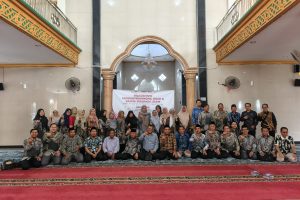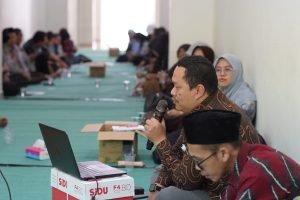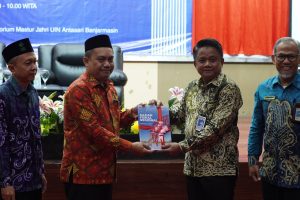
How Covid-19 Will Shape Our Education?
FEIB UIN Antasari with The National Islamic Finance Committee (KNEKS) and Association of Faculty of Islamic Economics and Business (AFEBIS) held a national webinar, which took place live on UINA TV Youtube Channel, Wednesday (21-22/7).
Entitled “FEIB curriculum towards an independent campus era” this event was filled with a discussion about the process of FEIB in the teaching and learning.
On this webinar present as speakers are Mamat S Burhanuddin (Head of Sub-Directorate of Research, CS and Scientific Publication, MoRA), Sutan Emir Hidayat (Director of Islamic Financial Education and Research of KNKS), and Murniati Mukhlisin (Rector of Tazkia Islamic University Collage).
Dean Fathurrahman Azhari said that courtesy of the coronavirus, universities are closed around the world, and classrooms are now entertained over video conferencing. This is not overly dramatic as this temporary arrangement will eclipse after cases are contained, and classes will resume soon after.
“However, the impacts on the university ecosystem will requires immediate renovations in higher education that will shape FEIB syllabus for years to come,” Dean Fathurrahman Azhari said.
“In Indonesia, many universities are facing a once in a century event, and younger ones a once in a lifetime event. Their future will be defined by their flexibility,” said Mamat S Burhanuddin.
The case of online education is tricky for economic and business training, as most the courses require some form of residency component -computing a large part of the course requirement, which is now hindering the progress of academic pursuit.
Lastly, FEIB is often hailed as a discipline of problem-solving, but its education has somehow principally revolved around the pursuit of economy. Increasing criticism continues to arise on solutions being disconnected from their immediate context. Through the sole pursuit of abstraction, the discipline seems to obstinately distance itself from pursuing real and practical solutions.
”Moreover, in a time where the world’s challenges keep morphing and uncertainties keep arising due to the constant change in variables, FEIB needs to keep up. FEIB needs to adopt an eclectic view of the world, regroup disciplines, and perhaps rebrand it to the art of wicked problem solvers,” said Sutan Emir Hidayat.
Rector of Tazkia Institute, Murniati Mukhlisin said that future FEIB to be equipped to face those, a review of the economic syllabus is needed where equal emphasis is provided on classroom just as much as other dimensions. Along with this, it may also be the time to expand the FEIB curriculum, merge across disciplines and truly work towards building the future.
(Courtesy: en.ccunesco.ca)




